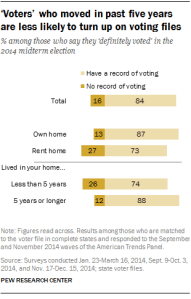The much-debated question of whether women are more religious than men is the focus of Pew Research Center’s recently released report “The Gender Gap in Religion Around the World.” The study finds that women are generally – but not universally – more religious than men in several ways. Indeed, data collected for the study show that in some religions and some contexts, men are as, or even more, religious than women.


Fact Tank discussed the report’s findings with David Voas, head of the Department of Social Science at University College London. A demographer and sociologist, Voas has written extensively about religion, spirituality and the transmission of beliefs and values from one generation to another.
What in your personal view are the most plausible explanations for the differences in religious commitment between men and women?
David Voas: Personally, I’m tempted to give the classic academic response that more research is needed. At the risk of seeming wishy-washy, I suspect that nature and nurture both play a part. Boys and girls are socialized differently and men and women are still channeled into different roles. When we look at the psychology of individual differences, though, particularly in personality, it’s not easy to attribute gender gaps in their entirety to social forces.
Can you explain in a little more detail what exactly you’re talking about when you suggest a possible biological basis for religious differences between men and women?
I’m not an expert in genetics, but there appears to be some fairly compelling evidence (for example from studies of twins) that genes do affect our disposition to be religious. And if that’s the case, it’s at least plausible that the gender gap in religiosity is partly a matter of biology. If true, though, I doubt that it’s because there’s a “God gene” and women are more likely to have it than men. It seems easier to believe that physiological or hormonal differences could influence personality, which may in turn be linked to variations in “spirituality” or religious thinking.
What do you see in our report on gender and religion that adds to the research on this subject?
The range of countries and the number of indicators of religious involvement used in the study make it possible to see the contrast between Christian and Muslim countries very clearly. In some ways the findings are counterintuitive. We’re used to thinking that the modernization of values, attitudes and behavior has made the West a land of comparative equality, while in the Muslim world large differences in the social and economic opportunities for men and women persist. Here’s an important case where the gender gap is much larger in Christian than in Muslim countries.
Does this mean that Christianity is more appealing to women than to men, and if so, why do you think this is the case?
Christianity presents itself as a religion of the powerless: “Blessed are the meek, for they shall inherit the earth.” Depending on your point of view, that’s appealingly feminine or appallingly effeminate. Friedrich Nietzsche wrote in his characteristically abrasive way that women need “a religion of weakness that glorifies being weak, loving, and … humble as divine.”
It’s true that some religions are more appealing to women – or men – than others. If we look at alternative spirituality, some varieties attract mostly women and others are of more interest to men. (Satanism falls into the latter category.) Christianity, too, comes in many forms, to such an extent that it is difficult to generalize about its appeal. The more patriarchal versions are possibly better at keeping men involved. Where men are mostly responsible for public worship, as in Orthodox Judaism and Islam, then of course the gender gap will look different. Overall, though, I doubt that there are important differences between the major world religions in their appeal to men and women. They have all survived and thrived for centuries.
Why do you think prayer frequency as opposed to other measures of religious commitment shows the largest gender gap in our study?
In a Christian context, prayer is often taken to be a product of intrinsic or private religiosity; its very invisibility makes it an indicator of personal commitment. The frequency of prayer may be the “purest” sign of religious commitment, which means that, arguably, it’s the best yardstick to use in comparing men and women.
By contrast, other measures of religious adherence are affected by extrinsic considerations such as social desirability. Perhaps the gender gaps for religious affiliation and worship service attendance, for example, are smaller because those indicators are wrapped up with tribal identity, which might be particularly important to men – at least if football is any indication.
Note that the situation is different for Muslims. Frequent prayer is a religious obligation, praying involves the whole body, and, for men especially, it’s often done in public. That means that it’s subject to a degree of social monitoring and hence social pressure. I’m not suggesting that Muslim men aren’t truly religious, I’m just saying that regular prayer means something different in Christian and Muslim societies.
What is your view of the argument that, in many countries, women are more religious than men because they’re less likely to have a job outside the home?
Some research does indeed suggest that working outside the home is associated with lower religious involvement. If we accept that finding (and the research results haven’t been wholly consistent), the interesting question is why that should be the case. Maybe paid employment crowds out time for religious involvement, or perhaps being exposed to different values and worldviews tends to undermine religious commitment. Alternatively, though, causality could operate in the other direction: Maybe women who already are less religious go out to work and those who are more traditional stay at home.